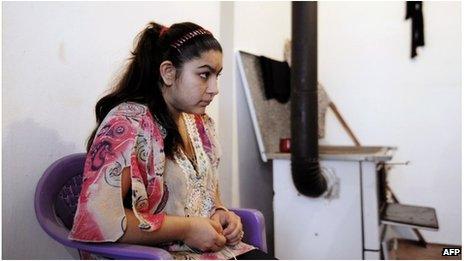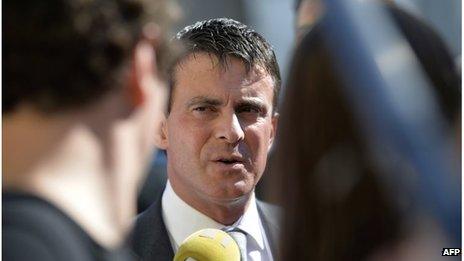Hollande: Deported Roma girl can return to France alone
- Published
The BBC's Christian Fraser says Mr Hollande's intervention is not enough to rescue his poll ratings
French President Francois Hollande has said a Roma girl who was removed from her school bus and deported can return to finish her studies, but that her family cannot.
Leonarda Dibrani, 15, was expelled along with her parents and five siblings earlier this month after they lost their battle for asylum in France.
The case has sparked protests by student groups across the country.
A government investigation ruled that the deportation had been legal.
But the report, released on Saturday, said any future such action against school children should be taken outside school hours.
The Dibrani family had been living in Levier, in the Doubs region of eastern France. They cited discrimination in Kosovo as grounds for asylum.
An order for their expulsion was issued after they lost their battle for asylum. After two postponements, it was rescheduled for October and the father, who was detained in a different town, was expelled on 8 October.
Leonarda had stayed at a friend's overnight so was not at the family home when border police arrived to deport them.
She was instead taken away by police in front of other students while on a field trip. The whole family were flown back to Kosovo that day.

Leonarda Dibrani said she did not want to return to France without her family
Mr Hollande told French TV: "If she makes a request, because of the circumstances, and because she wants to pursue her schooling in France, a welcome will be extended to her."
But he stressed that the invitation was to Leonarda alone.
The girl has said she will not return to France without her family.
"I will not abandon my family. I'm not the only one who has to go to school, there are also my brothers and sisters," the AFP news agency quoted her as saying.
Children 'begging'
Leonarda's father, Resat Dibrani, told reporters in Mitrovica, where the family are now living, that they would not stay in Kosovo.
"I have no freedom here for myself, my children and my family. The police can say whatever they want, but for me, justice does not work in France."
But he said the family would not be split up by his daughter going alone.
"Either we all go together or nobody goes."
Mr Dibrani had admitted this week that he had lied about the children's origins in the hope of boosting their asylum application - only he is from Kosovo but his wife and six children were all born in Italy.
The mayor of the Italian town of Fano, where the family lived for several years, said they left after the authorities there threatened to take the children into care.
"The children hardly ever went to school even though he had signed them up. He sent them out begging. They lived in the streets," Stefano Aguzzi told AFP.
"We told him that he could not continue living here without paying for anything. We gave him a set of rules for him to be able to stay."

Interior Minister Manuel Valls has faced criticism over the deportation
Mr Aguzzi said that if the family returned, Fano officials would "not welcome them back with open arms" but that would "consider them like we do all the other immigrants".
Hundreds of French students have staged protests against the deportation, and the manner in which Leonarda was removed, in Paris and other cities.
Much of the anger has been directed at Interior Minister Manuel Valls, previously a popular figure.
The BBC's Christian Fraser in Paris says Mr Valls has also faced bitter recriminations from within his own party, accused of betraying the principles of the socialist government.
But the government was also warned by the right-wing opposition that if it caved into the protests and allowed the family back, it would set a dangerous precedent, says our correspondent.
Mr Hollande's invitation to Leonarda is perhaps the president's best way out of damaging few days, he adds.
- Published27 September 2013
- Published25 September 2013
- Published16 October 2013